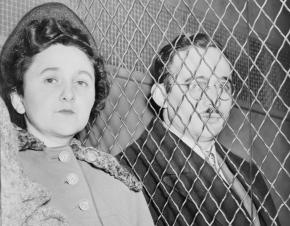A threat facing all activists
Activist, author and attorney is the younger son of Ethel and Julius Rosenberg. In 1953, when he was six years old, the U.S. government executed his parents for "conspiring to steal the secret of the atomic bomb." In 1990, he started the Rosenberg Fund for Children to provide for the educational and emotional needs of children whose parents have been harassed, injured, jailed, lost jobs or died in the course of progressive activism.
Here, Meeropol explains why progressives should unite to defend Julian Assange against attempts to prosecute him for espionage for his work on WikiLeaks.
RUMORS ARE swirling that the United States is preparing to indict WikiLeaks leader Julian Assange for conspiring to violate the Espionage Act of 1917.
The modern version of that act states, among many, many other things, that: "Whoever, for the purpose of obtaining information respecting the national defense with intent or reason to believe that the information is to be used to the injury of the United States" causes the disclosure or publication of this material, could be subject to massive criminal penalties.
It also states that: "If two or more persons conspire to violate any of the foregoing provisions...each of the parties to such conspiracy shall be subject to the punishment provided for the offense which is the object of such conspiracy." (18 U.S. Code, Chapter 37, Section 793.)
I view the Espionage Act of 1917 as a lifelong nemesis. My parents were charged, tried and ultimately executed after being indicted for Conspiracy to Commit Espionage under that act.
The 1917 Act has a notorious history. It originally served to squelch opposition to the First World War. It criminalized criticism of the war effort, and sent hundreds of dissenters to jail just for voicing their opinions. It transformed dissent into treason.

Many who attacked the law noted that the framers of the Constitution had specifically limited what constituted treason by writing it into the Constitution: "Treason against the United States shall consist only in levying war against them, or in adhering to their enemies, giving them aid and comfort" (Article III, section 3). The framers felt this narrow definition was necessary to prevent treason from becoming what some called "the weapon of a political faction."
Furthermore, in their discussions at the Constitutional Convention, they agreed that spoken opposition was protected by the First Amendment and could never be considered treason.
IT APPEARS obvious that the Espionage Act is unconstitutional because it does exactly what the Constitution prohibits. It is, in other words, an effort to make an end run around the treason clause of the Constitution.
Not surprisingly, however, as we've seen in times of political stress, the U.S. Supreme Court upheld its validity in a 5-4 decision. Although later decisions seemed to criticize and limit its scope, the Espionage Act of 1917 has never been declared unconstitutional.
To this day, with a few notable exceptions that include my parents' case, it has been a dormant sword of Damocles, awaiting the right political moment and an authoritarian Supreme Court to spring to life and slash at dissenters.
It is no accident that Julian Assange may face a "conspiracy" charge, just as my parents did. All that is required of the prosecution to prove a conspiracy is to present evidence that two or more people got together and took one act in furtherance of an illegal plan. It could be a phone call or a conversation.
In my parents' case, the only evidence presented against my mother was David and Ruth Greenglass' testimony that she was present at a critical espionage meeting and typed up David's handwritten description of a sketch. Although this testimony has since been shown to be false, even if it were true, it would mean that the government of the United States executed someone for typing.
But the reach of "conspiracy" is even more insidious. It means that anyone with whom my parents could have discussed their actions and politics could have been swept up and had similar charges brought against them if someone testified that those conversations included plans to commit espionage. Thus, the case against my parents was rightly seen by many in their political community of rank-and-file Communist Party members as a threat to them all.
Viewing the WikiLeaks situation through this lens, it becomes apparent why the government would seek to charge Assange with conspiracy. Not only Assange, but anyone involved in the WikiLeaks community could be swept up in a dragnet.
Just as in my parents' case, the prosecutors could seek to bully some involved into ratting out others, in return for more favorable treatment. This divide-and-conquer approach would turn individuals against each other, sow the seeds of distrust within the broader community and intimidate others into quiescence.
This kind of attack threatens every left-wing activist. I urge all progressives to come to the defense of Julian Assange should he be indicted for violating the Espionage Act of 1917.
First published at the Rosenberg Fund for Children Web site.


